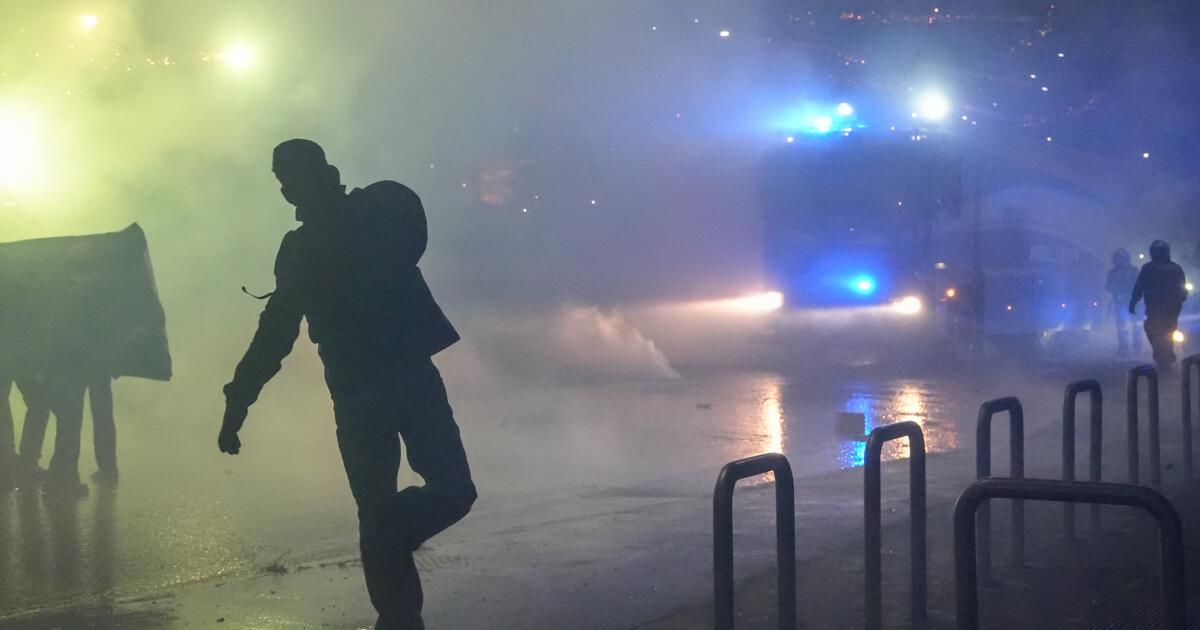Italian police fire tear gas in clash with protesters near Olympics venue
MILAN — Italian police fired tear gas and a water cannon at dozens of protesters who threw firecrackers and tried to access a highway near a Winter Olympics venue Saturday.
The brief confrontation came at the end of a peaceful march by thousands highlighting the environmental impact of the Games and the presence of U.S. Immigration and Customs Enforcement agents in Italy.
Police held off the demonstrators, who appeared to be trying to reach the Santagiulia Olympic ice hockey rink. By then, the larger peaceful protest, including students and families with small children, had dispersed.
Earlier, a group of masked protesters had set off smoke bombs and firecrackers on a bridge overlooking a construction site about half a mile from the Olympic Village that’s housing about 1,500 athletes.
Police vans behind a temporary metal fence secured the road to the athletes’ village, but the protest veered away, continuing on a trajectory toward the Santagiulia venue. A heavy police presence guarded the entire route.
There was no indication that the protest and resulting road closure interfered with athletes’ transfers to their events, all on the outskirts of Milan.
The demonstration coincided with U.S. Vice President JD Vance’s visit to Milan as head of the American delegation that attended the opening ceremony Friday, during which Vance was booed.
He and his family visited Leonardo da Vinci’s “The Last Supper” closer to the city center, far from the protest that denounced the deployment of ICE agents to provide security for the U.S. delegation. ICE has drawn international condemnation for its role in the Trump administration’s aggressive immigration crackdown in U.S. cities, including the fatal shooting of two people in Minneapolis last month by ICE and U.S. Border Patrol agents.
U.S. Homeland Security Investigations, an ICE unit that focuses on cross-border crimes, frequently sends its officers to overseas events like the Olympics to assist with security. The ICE arm at the forefront of the immigration crackdown in the U.S. is known as Enforcement and Removal Operations, and there is no indication its officers are being sent to Italy.
At the larger, peaceful demonstration, which police said numbered 10,000, people carried cardboard cutouts to represent trees felled to build the new bobsled run in Cortina d’Ampezzo. A group of dancers performed to beating drums. Music blasted from a truck leading the march, one a profanity-laced anti-ICE anthem.
“Let’s take back the cities and free the mountains,” read a banner by a group calling itself the Unsustainable Olympic Committee. Another group called the Assn. of Proletariat Excursionists organized the cutout trees.
“They bypassed the laws that usually are needed for major infrastructure projects, citing urgency for the Games,” said protester Guido Maffioli, who expressed concern that the private entity organizing the Games would eventually pass on debt to Italian taxpayers.
Homemade signs read “Get out of the Games: Genocide States, Fascist Police and Polluting Sponsors,” the final one a reference to fossil fuel companies that are sponsors of the Games. One woman carried an artificial tree on her back decorated with the sign: “Infernal Olympics.”
The demonstration followed another recently at which hundreds protested the deployment of ICE agents.
Like that protest, demonstrators Saturday said they were opposed to ICE agents’ presence, despite official statements that a small number of agents from an investigative arm would be present in U.S. diplomatic territory, and not operational on the streets.
Barry and Rosa write for the Associated Press.
